 Petzlover
PetzloverNorwegian Forest Cat is originated from Norway but Viverral is originated from United States. Both Norwegian Forest Cat and Viverral are having almost same weight. Both Norwegian Forest Cat and Viverral has almost same life span. Both Norwegian Forest Cat and Viverral has same litter size. Norwegian Forest Cat requires Moderate Maintenance. But Viverral requires Low Maintenance
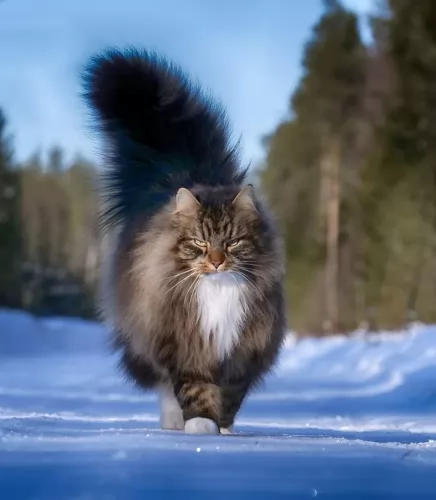 The beautiful Norwegian Forest cat has a thick fur to survive the snow and icy weather in Norway. It is the official cat of Norway.
The beautiful Norwegian Forest cat has a thick fur to survive the snow and icy weather in Norway. It is the official cat of Norway.
It originated in Northern Europe. It is believed that the cat was brought to Norway from Great Britain way back in the time of the Vikings. It is also believed that it reproduced with farm cats and has become the modern-day Norwegian Forest breed.
They were discovered in the early twentieth century by cat enthusiasts and in 1938 an organization was established devoted to this breed.
Also, a club was started for the cat in Oslo so as to preserve the breed. The 2nd World War saw the cat all but disappear but a breeding program was started. It was registered in Europe by the 1970s, and in 1994 by the American Cat Fanciers Association and others.
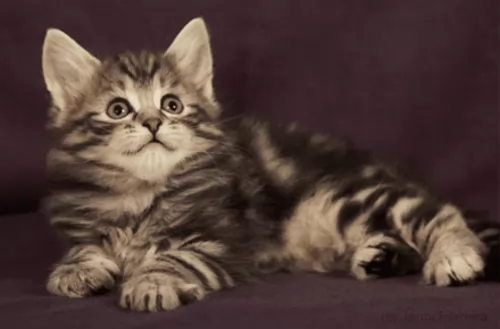 This domestic cat is a natural breed with a thick coat of long water-resistant fur and a woolly undercoat. The coat can be in many colors and patterns.
This domestic cat is a natural breed with a thick coat of long water-resistant fur and a woolly undercoat. The coat can be in many colors and patterns.
This is a big, strong, heavy boned cat with a bushy tail and long legs. It’s larger than your regular cat and can weigh anything between 3 and 9kg. The eyes are almond-shaped and can be any color while the large ears are high set.
In spite of this being a large cat, they are energetic and yet they don’t like being around boisterous, energetic pets. They are friendly, calm, gentle, and intelligent and enjoy being part of a human family.
They tend to be a bit reserved around strangers. It’s not a demanding cat and can entertain himself with his toys.
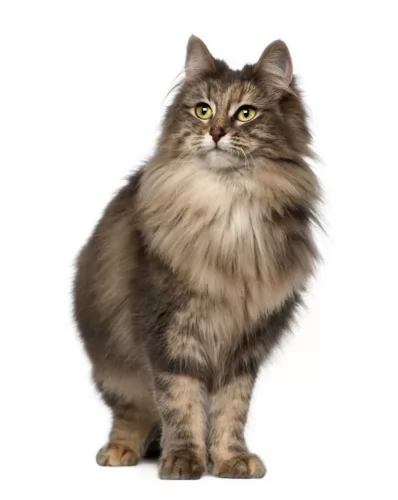 Remember that your large Norwegian Forest cat likes to scratch so you want to provide him with a scratching post. He is so companionable, you want to reward him by ensuring you make his life as easy as possible.
Remember that your large Norwegian Forest cat likes to scratch so you want to provide him with a scratching post. He is so companionable, you want to reward him by ensuring you make his life as easy as possible.
Known as a gentle giant, the beautiful and undemanding Norwegian Forest cat will appreciate a calm household where he can quietly enjoy the companionship of the humans he loves.
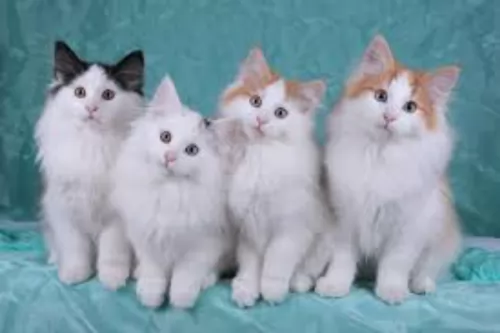 The lifespan of this big, longhaired cat is usually 14 to 16 years, but you need to check out kidney and heart disease with this particular breed as well as patellar luxation.
The lifespan of this big, longhaired cat is usually 14 to 16 years, but you need to check out kidney and heart disease with this particular breed as well as patellar luxation.
You don’t want your cat having problems with the knee cap as this takes away from his ability to leap, pounce and crouch. It’s when the patella or kneecap is out of place. There may not necessarily be pain for your pet and in fact, your cat may not show any signs of abnormality till the condition has become quite advanced.
Your cat can actually become lame. You want to avoid this with the Norwegian as it's a particularly good climber.
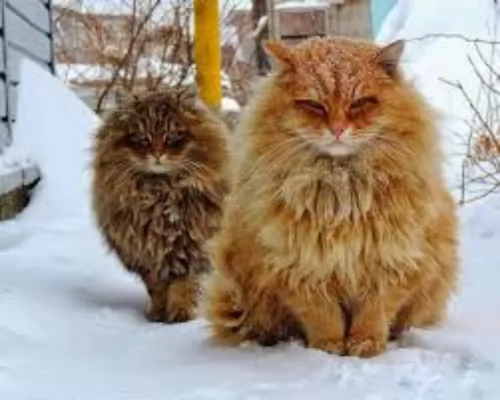 The Norwegian has a long coat so you will need to brush it at least twice a week to keep it nice and shiny and free from tangles.
The Norwegian has a long coat so you will need to brush it at least twice a week to keep it nice and shiny and free from tangles.
Trim your Norwegian forest cat’s claws. You will need a special nail clipper, but if you're nervous to cut the nails yourself, your vet or pet groomers can do it for you.
Cats battle quite a bit with periodontal disease and an excellent diet can help to prevent this. Cats hate you sticking a toothbrush into their mouths – they can become terrified - and it would b kinder to simply have your cat’s teeth checked out at the vet when you suspect that something might be wrong. At the same time, you can ask to have the inside of your cat’s ears checked for dirt and infection.
Keep your cat’s litter box spotlessly clean. These cats dislike a dirty litter box intensely. Remove all feces every single day – more often even if possible.
One good way to select the best food for your cat is to read the ingredients. The first two ingredients listed on the package should always be meat. Select a high-quality cat food. Keeping Norwegian Forest cats in good health requires high-quality cat food to meet all of your Norwegian forest cat’s nutritional needs.
You can feed your Norwegian Forest cat two meals per day. Always check with your veterinarian for a recommendation on how much and what to feed your cat.
Provide a constant supply of fresh, clean water for your Norwegian Forest cat.The bowl should be in an easy place for your cat to reach and in the shade.
Provide your Norwegian with a soft bed in a quiet, restful place.